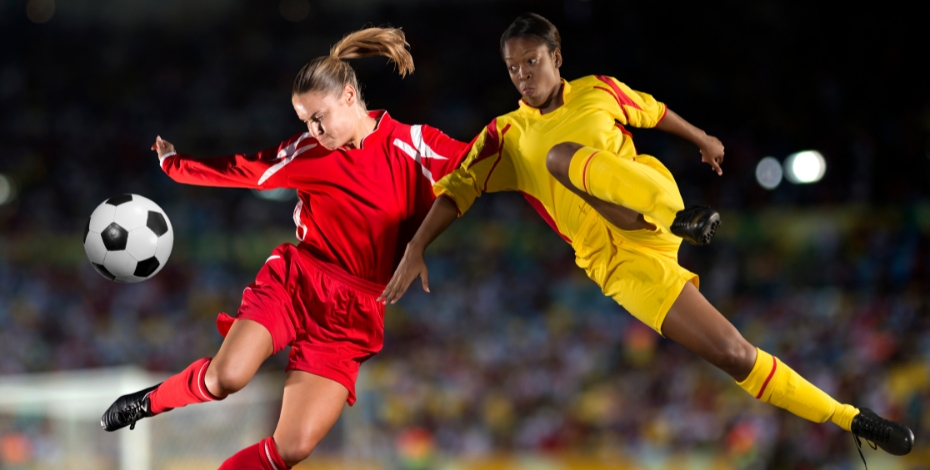Concussion in focus for FIFA and Matildas’ physiotherapists ahead of World Cup
July 19, 2023

The awareness around sport-related concussions has been steadily increasing over recent years, causing Fédération Internationale de Football Association (FIFA) Injury Spotter Kerry Peek and Matildas’ Head Physiotherapist Jaclyn Benz to take strong prevention and assessment measures into account as the tournament kicks off.
The late Heather Anderson’s recent diagnosis with chronic traumatic encephalopathy (CTE) has reignited the concussion debate over the past month. Heather is the first female athlete in any sport to be diagnosed with CTE, and one of the very few women who have ever been diagnosed with the progressive degenerative brain disease.
FIFA is employing ‘concussion spotters’ for the first time in a Women’s World Cup this tournament, after their successful debut at the men’s World Cup in Qatar last year. There are strict protocols from the governing body for returning to play following a suspected or diagnosed concussion, with the referee being able to stop play in order for the player to be safely removed from the pitch.
Australian Physiotherapy Association (APA) physiotherapist Kerry Peek said these protocols have come about in recent years after mounting evidence that players who continued to play following a concussion have an increased risk of further injury. Second impact syndrome or subsequent musculoskeletal injury¹, such as anterior cruciate ligament (ACL) tears², are some of the most common.
“The most common type of head impact causing concussion is generally head-to-head contact which accounts for approximately three per cent of all injuries in football³. Concussion spotters are another pair of eyes during the match, there to support the FIFA Medical Coordinator and medical teams to identify players’ potential head injuries during the match,” Kerry said.
“Evidence is also beginning to suggest that women sustain more and take longer to recover from concussions in sport than men. It also extends beyond concussions to other major injuries such as ACL tears, where female soccer players are almost three times more likely to suffer and ACL injury than males⁴,” Kerry said.
APA Sports and Exercise Physiotherapist Jaclyn Benz welcomes the addition of the FIFA injury spotters and places a strong emphasis on ensuring the safety of the Matildas players.
“We have strict protocols for returning to play following concussion, which is led by our team sports physician. We also use consultant specialist physiotherapists in the area to assist with more difficult cases to ensure we are getting the players the best treatment available,” she said.
Jaclyn is heading into the World Cup arming the Matildas with individualised preparation programs that account for congested schedules and increased number of matches; both being significant risk factors when players are moving fluidly between different leagues and other major tournaments.
“Taking a player’s injury history and any injury profiling into account when developing these programs in addition to their schedule, is critical to assist us in injury prevention. The first 30 minutes of any given match in this game are key, as 64 per cent of ACL injuries occur during this time⁵. This tells us that fatigue is not a factor in a proportion of these types of injuries⁶; and rather that these injuries are impacted by other factors of player management,” Jaclyn said.
Both physiotherapists will be keeping a close eye on the players to assess, diagnose and manage any major injuries. The concussion and ACL injury rates are likely to be higher than last year’s men’s World Cup in Qatar, taking into account the significant difference in the number of concussions and ACL injuries in female sports when compared to male sports⁷.
“Players who are rehabilitating from an ACL injury are managed in accordance with strict protocols that are criteria and objective marker based, rather than purely relying on a set time frame for their return. Our players are based all over the world and each require a tailored travel plan to reduce the likelihood of injuries in the first few days of arriving here for the tournament,” Jaclyn said.
Kerry Peek is a physiotherapist with a background in sports injury research. She is currently an Injury Spotter for FIFA organised tournaments (2023-U20s Men’s World Cup and Women’s World Cup) and a member of UEFA’s Heading Expert Group and Football Australia’s Expert Working Group (Heading and Concussion).
Jaclyn Benz is the Head Physiotherapist for the Matildas. She is also an APA Sports and Exercise Physiotherapist and a member of the Australian College of Physiotherapists.
The concussion rules were evident for Australia with the semi-final and 3rd/4th playoff loss of Australian central defender, Alanna Kennedy. Read the article here.
References
¹ ³ Serner, A. et al. (2022) Video review of the frequency and assessment of head impacts during the FIFA Arab Cup 2021. Available at: https://www.tandfonline.com/doi/full/10.1080/24733938.2022.2120629
² McPherson, A.L. et al. (2020) Effect of a concussion on anterior cruciate ligament injury risk in a general population – sports medicine, SpringerLink. Available at: https://link.springer.com/article/10.1007/s40279-020-01262-3
⁴ Edith Cowan University, Perth, Western Australia (2022) Why do female athletes seem to get more injuries than men?, ECU. Available at: https://www.ecu.edu.au/newsroom/articles/opinion/why-do-female-athletes-seem-to-get-more-injuries-than-men
⁵ ⁶ ⁷ Silvers-Granelli, H. (2021) ‘Why female athletes injure their ACL’s more frequently? what can we do to mitigate their risk?’, International Journal of Sports Physical Therapy, 16(4). doi:10.26603/001c.25467.
Courtesy: Australian Physiotherapy Association Media Release July 20, 2023
